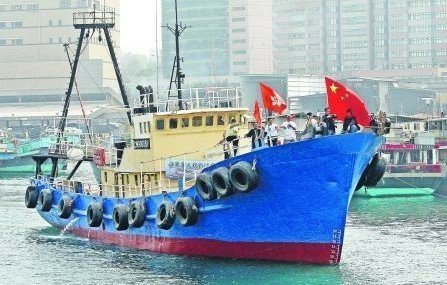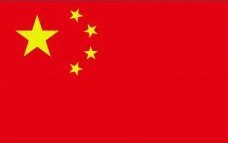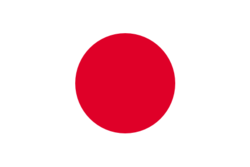HOME >> CHINA
Japan urged to ensure safety of Diaoyu activists
Source:Globaltimes.cn Published: 2012-8-14 14:36:00
| Editor's Note |
Chinese activists from Hong Kong landed on the Diaoyu Islands on Wednesday, according to Japan Coast Guard.
Experts Monday called on Japan to show restraint over an activist group's recent assertion of China's sovereignty over the islands, one day after a Hong Kong activist group set sail for the Diaoyu Islands in the East China Sea.
| Latest News |
Chinese activists land on Diaoyu Islands: Japan Coast Guard
Activists from Hong Kong landed on the Diaoyu Islands on Wednesday, according to Japan Coast Guard.
Japan urged to ensure safety of Diaoyu activists
Reports said the Japanese lawmakers were scheduled to hold a vigil for the victims of a refugee shipwreck during wartime on the islands. However, the Japanese government has turned down the plan for fear of causing an "unexpected incident" between China and Japan, and having a negative impact on the Japanese government's plan to "nationalize" the Diaoyu Islands, according to Kyodo News.
Be wary of Japan’s radical acts on Diaoyu
A ship from Hong Kong sailed into the open sea on Augutst 13 and plans to head toward the Diaoyu Islands with an activists' ship from Taiwan. The Japanese side previously claimed that they might send Self-Defense Forces to block activists from the Chinese mainland, Taiwan and Hong Kong from landing on the islands. Though the Japanese embassy has denied the claim, the situation surrounding the Diaoyu Islands looks grim.
Related reports:
Japan recalls Chinese ambassador over Diaoyu tensions
Diaoyu Islands can't be 'bought': FM spokesman
Taiwan backs Diaoyu activists as mainland urges Japanese restraint
| Activists' Voyage |
 File Photo: Pictured is the ship where 15 Chinese activists were on board to the Diaoyu Islands in the East China Sea. Photo: china. cnr.cn |
Scheduled boarding time: August 15, the memorial day of victory over Japan during World War II |
| People: A total of 15 activists on board, including four crew members and 11 activists from Hong Kong, Macao and the Chinese mainland | |
| Ship: The ship belongs to the Action Committee for Defending the Diaoyu Islands. | |
| Task: to reach the Diaoyu Islands and assert China’s sovereignty over the islands. | |
| Route: start Sunday noon from Hong Kong and to meet with the vessels of their Taiwanese counterparts in the Taiwan Straits Tuesday and reach the Diaoyu Islands together on August 15 | |
| Cause: a response to some 50 Japanese lawmakers' plan to set foot on the Diaoyu Islands on August 19 |
Difficulties: might be blocked by Japan’s Self-Defense Forces from landing on the islands. |
| Stances |
 |
 |
| China’s Ministry of Foreign Affairs The Ministry of Foreign Affairs made no comment on the boarding when contacted by the Global Times. Previously, China's Foreign Ministry spokesman Liu Weimin said that the Chinese government will continue to take necessary measures to resolutely safeguard the sovereign rights of the Diaoyu Islands and adjacent islets. |
The Japanese Chief of Staff The Japanese Chief of Staff had ordered the Self-Defense Forces to make a battle plan in response to the "provocation" of the Chinese vessels heading for the Diaoyu Islands, Sankei Shimbun reported on Monday. Embassy of Japan in China The Embassy of Japan in China told the Global Times that there was no such plan. |
Activists:
The activists said they had no fears for their safety. "I don't think the Chinese fishery administration boats will turn a blind eye to our patriotism," Li Yiqiang, a mainland activist with the group, told the Global Times Monday.
Expert:
Geng Xin, deputy director of the Tokyo-based Japan-China Communication Institute
"Japan's constant aggressive activities have provoked Chinese people's actions on asserting sovereignty over the Diaoyu Islands, and the Japanese government should stay restrained on China's grass-roots activities of defending its territorial sovereignty."
| Media Comments |
 |
Be wary of Japan’s radical acts on Diaoyu China needs to use different channels to warn Japan to restrain itself. Grass-roots activists from China are not new elements in the disputes. Japan's reaction cannot break the practices of the past. They have to ensure the safety of Chinese activists. Unexpected mishaps due to Japan's blocking will lead to retaliations from both the Chinese government and the public. Anti-Japanese sentiment is also running high in Russia and South Korea. Japan has become isolated in the East Asia territorial disputes. The Chinese mainland also has support from Taiwan and Hong Kong. Japan will not gain any advantage if the conflict intensifies. |
 |
Activists heading to Diaoyu Islands Sunday Activists and government officials Monday vowed to protect the right of Taiwanese fishing boats to operate around the disputed Diaoyu Islands and to defend the country’s sovereignty over the region. |
 |
Japan shows short-sighted rashness in island disputes Japan appears to be mired in bitter domestic conflict which has played back upon its foreign policy in a fresh attempt to "nationalize" Diaoyu Islands in the East China Sea that actually belong to China. |
 |
Nearly seven decades later, Northeast Asia still haunted by war Managing the feud with China over the Diaoyu islands near potentially huge oil and gas reserves could be tougher at a time when China -- where memories of Japan's military occupation run deep -- faces a once-in-a-decade leadership change and Japan worries about its rival's rising regional and global clout. |
| Incident Review |
Source: Global Times-Xinhua
Posted in: Diplomacy
